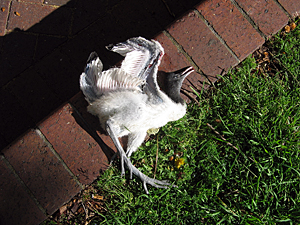 In parts one through eight I first introduced, then explained and summarized my Topography of Skill Acquisition. But as I made clear in Part 3, the absolutely essential event to ever add a skill to your resume is to not die on the Plain of Suckitude. Because if you do, you are never coming back.
In parts one through eight I first introduced, then explained and summarized my Topography of Skill Acquisition. But as I made clear in Part 3, the absolutely essential event to ever add a skill to your resume is to not die on the Plain of Suckitude. Because if you do, you are never coming back.
So this post is all about strategies to help you get through that terrible, awful, embarrassing, and painful time so that you can add another skill to your repertoire. Here are just a few words of advice, based on my personal experience:
- Attitude. “Yes, I will”. Not, “No, I can’t” — This no doubt sounds trite, because it is. But it’s also true. Attitude means a lot. If you try to learn a new skill imagining that you will fail, you likely will. Go in with the right attitude or you’re done before you start. Also, don’t allow anyone to tell you that you can’t learn a particular skill. You can.
- Perspective. Act like you don’t care what people think about you. — A good part of what makes The Plain of Suckitude the way that it is is not just that you suck at the particular skill you are trying to learn, but that you likely look like an idiot while doing it. Depending on the skill, you might fall down, or sing off-key, or crash spectacularly. And since most skills are learned among the company of others, you expose yourself to ridicule. Or at least you think you do. To gain perspective, start by acting like you don’t care what people think of you. Then realize that they really don’t think what you think that they think. Most people sympathize. They’ve been there too. They know it’s hard. So buck up and get on with it.
- Knowledge. Know that an elevator awaits. — To refer to another trite saying, “It’s always darkest before the dawn.” I came to know that when learning new things, one of my daughters would become the most frustrated just before her breakthrough. This is because she could feel that you she was almost getting it, but when things didn’t turn out that way, she would become very frustrated. Use this to your benefit. When you have become very frustrated with the new skill you are trying to learn, know that this is exactly the wrong time to give up, as you are very close to the breakthrough that will place you on the Long Incline of Experience. Hang in there.
- Permission. Allow yourself to fail. Often. Spectacularly. — It is one thing to act like you don’t care what others think of you, it is quite another to give yourself permission to suck at some new skill. I feel this gets more difficult as we age, since adults — particularly older adults — tend to feel like they should have acquired all the skills they need by now. This is a trap. No one should feel like they are too old for anything — anything — unless there are truly constraints brought on by physical or mental infirmities. Also, keep in mind that failure only remains so if you quit. No one who has successfully acquired a new skill thinks they have failed — even if they failed many, many times before making it. It’s the end point that matters, not how you got there.
- Humor. Anything worth doing is also worth a laugh. — Humor is such a healer. It isn’t a coincidence that we often say “If I didn’t laugh, I’d cry”. Laughter can be a coping mechanism. When you take that spectacular header into the snow bank, have a laugh with your companions over it. We sometimes tend to take ourselves too seriously, but I have news for you — the universe sure doesn’t.
This post concludes the series. If you had even half as much fun reading it as I did writing it, I’d say we both did O.K. Here is the Prezi presentation that started off this blog series. Meanwhile, go out and add some new skills that society doesn’t think you should have. That’s right. Be Different.


I recently saw a news story that speaks to the point that we’re never too old to learn something new. An 89 year old veteran has just learned to read, after years of trying and failing. http://www.cbsnews.com/8301-18563_162-57572173/wwii-veteran-wins-battle-against-lifelong-foe